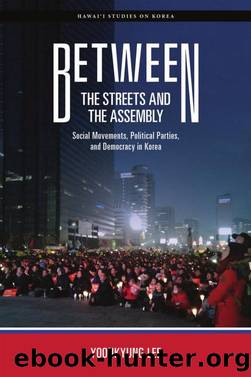Between the Streets and the Assembly by Yoonkyung Lee;

Author:Yoonkyung Lee;
Language: eng
Format: epub
Publisher: University of Hawai'i
Published: 2022-06-15T00:00:00+00:00
With a structure that mirrors the governmentâs, the PSPD has strived to transform state policies and influence congressional activities. The participation of more than two hundred professionals and fifty full-time activists has enabled the organization to craft policy alternatives and influence national politics. The PSPD established the Research Institute for Participatory Society in 1996 and has published Citizen and the World, a biannual scholarly journal, since 2002. During their twenty-year presence (1994â2014), the organization issued 2,373 policy reports, organized 1,958 public hearings and press conferences, and published 514 volumes on policy analyses and proposals (PSPD 2014). In addition to issuing public statements, the PSPD organized various forms of activities, including advocacy campaigns (academic conferences, public hearings, press conferences, and public surveys), direct action (protests, rallies, and public campaigns), legislative pressure (legislative proposals and petitions),24 litigation (lawsuits, civil action, administrative litigation, and constitutional appeals), and public events (PSPD 2014, 54).
Particularly noteworthy are the PSPDâs activities aimed at the âinstitutionalization of alternativesâ (daeaneui jedohwa), which focused on reforming legal institutions that govern the operation of the legislature and political parties (Tae, interview with the author, Seoul, May 19, 2015). The PSPD submitted 143 legislative petitions per year between 1988 and 2006 (J. Yoon 2016) and was at the forefront of submitting legislative petitions and proposals in the areas of the election law, the political parties law, and the political finance law. While many of its petitions were rejected in the National Assemblyâs official review process, the contents of PSPD proposals were substantively reflected in the actual legislative reform drafted and signed by national lawmakers (PSPD 2014). This brief description of the PSPDâs activities over the past twenty-five years demonstrates why civil organizations in Korea are often referred to as political institutions of proxy representation (Cho and Cho 2001) or as quasi-political parties (K. Shin 2006). The key SMOs function almost like political parties, by articulating citizen interests, aggregating citizensâ demand for political and socioeconomic reforms, and producing policy alternatives. With sustained campaigns and pressuring, many policy proposals generated by civic associations were adopted by the executive and legislative bodies.
The influence of SMOs such as the PSPD reached its peak under the two centrist governments of Kim Dae-jung (1998â2002) and Roh Moo-hyun (2003â2007), which offered greater institutional openness to nonstate actors than the conservative administrations (Chang and Shin 2011). First, many activist leaders were recruited to head government agencies or to run in public elections (discussed in chapter 4). Second, state agencies opened channels through which civil society could participate in the policy-making process. For instance, the Office of the Prime Minister included PSPD policy reports as some of the most referenced documents, on par with those by leading research institutes such as the Samsung economic Research Institute and the Korea Development Institute (S. Yoon 2007). Policy changes in the areas of gender equality were possible largely due to the close cooperation between government officials and womenâs activist groups (Jones 2006). Third, while civic organizations actively participated in the politics of policy change
Download
This site does not store any files on its server. We only index and link to content provided by other sites. Please contact the content providers to delete copyright contents if any and email us, we'll remove relevant links or contents immediately.
The Sympathizer by Viet Thanh Nguyen(4095)
The Rape of Nanking by Iris Chang(4023)
World without end by Ken Follett(3345)
Ants Among Elephants by Sujatha Gidla(3279)
Blood and Sand by Alex Von Tunzelmann(3055)
Japanese Design by Patricia J. Graham(3000)
City of Djinns: a year in Delhi by William Dalrymple(2435)
Foreign Devils on the Silk Road: The Search for the Lost Treasures of Central Asia by Peter Hopkirk(2388)
Inglorious Empire by Shashi Tharoor(2345)
The Queen of Nothing by Holly Black(2318)
In Order to Live: A North Korean Girl's Journey to Freedom by Yeonmi Park(2302)
India's Ancient Past by R.S. Sharma(2295)
Tokyo by Rob Goss(2292)
India's biggest cover-up by Dhar Anuj(2245)
Tokyo Geek's Guide: Manga, Anime, Gaming, Cosplay, Toys, Idols & More - The Ultimate Guide to Japan's Otaku Culture by Simone Gianni(2239)
The Great Game: On Secret Service in High Asia by Peter Hopkirk(2228)
Goodbye Madame Butterfly(2162)
Batik by Rudolf Smend(2007)
Living Silence in Burma by Christina Fink(1977)
